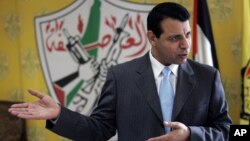Egyptian and Palestinian leaders met in Cairo on Sunday amid signs of a rapprochement between Cairo and the Islamic militant Hamas group that could shake up Gaza's political landscape and sideline the Palestinian president.
Officials close to Mahmoud Abbas said the Palestinian leader met with President Abdel-Fattah el-Sissi to seek clarifications on what appears to be an emerging power-sharing agreement between Gaza's Hamas rulers and an exiled Abbas rival, former Gaza strongman Mohammed Dahlan.
Under the deal - parts of which have been confirmed by other parties involved - Hamas would retain control over Gaza's security, while Dahlan would eventually return to Gaza and handle its foreign relations.
The officials spoke on condition of anonymity because they were not authorized to speak to the media.
Neither leader made any comments to the media after their meeting in Cairo. A statement by Egypt's presidential spokesman stuck to generalities. The two leaders, the statement added, discussed the latest developments in the Palestinians' bid for statehood and ways to revive the peace process.
Dahlan was a key Fatah figure behind the Fatah-Hamas street clashes that erupted after Hamas' victory in parliamentary elections in 2006, which eventually led to the violent takeover of Gaza by the group a year later.
Dahlan and Hamas have been bitter enemies, but their interests began to align in recent months. Dahlan's desire to return from exile and one day succeed Abbas has coincided with Hamas' growing desperation as Abbas has been applying greater financial pressure on Gaza.
The emerging understandings between Egypt, Hamas and Dahlan could pose a serious political threat to Abbas and the prospects of Palestinian statehood in the West Bank, Gaza Strip and east Jerusalem - the lands Israel captured in the 1967 Mideast war. A Palestinian "mini state" in Gaza could undermine the official state sought by Abbas and others within the pre-1967 lines.
If implemented, such understandings would likely help ease Gaza's decade of isolation, but would also deepen the Israeli-enforced disconnect between Gaza and the West Bank. The two territories lie on opposite sides of Israel.
Egypt has long accused Hamas of providing sanctuary as well as supporting Islamic militants fighting its security forces in the turbulent north of the Sinai Peninsula, a region that borders Gaza and Israel. Also, Egypt has for a decade joined Israel in a blockade of Gaza - the densely populated coastal strip on the Mediterranean that Hamas has ruled for a decade.
However, relations between Egypt and Hamas appear to have recently thawed.
Hamas officials said the two sides have negotiated security arrangements for the Gaza-Egypt border to ensure that militants operating in Sinai don't use Gaza as a refuge. In line with the agreement, Hamas has begun creating a security buffer zone along Gaza's border with Egypt. In return, Egypt has provided Gaza's rulers with fuel for its power station, easing the rolling blackouts that have for long fed discontent among Gaza's two million residents.
The Egyptian fuel shipments appear to have undermined the stepped up financial pressure on Hamas by Abbas. The Palestinian president had hoped such measures, including subsidy cuts and a reduction in payments for Gaza electricity, would force Hamas to cede ground in Gaza and gradually turn the population against the ruling group.
Speaking ahead of the el-Sissi-Abbas meeting in Cairo, an Egyptian diplomat briefed on the issues said Egypt's president was expected to tell Abbas that Cairo cannot keep Gaza sealed off forever, and that it needed to attend to the territory's needs. He said el-Sissi was also expected to tell Abbas that he was welcome to play a senior role in Gaza.
The officials close to Abbas said they had only heard of the Dahlan-Hamas and Egypt-Hamas agreements second hand, increasing their concerns.
In remarks Saturday, Gaza-based Hamas leader Ismail Haniyeh lauded the new security coordination with Egypt. Speaking a day after Islamic State militants killed at least 23 Egyptian soldiers in the deadliest attack in Sinai in two years, he said Hamas was "carrying out intensive measures on the border with Egypt to prevent any infiltration" into Gaza after the attack.
Separately, Dahlan and Hamas reached several understandings, according to officials on both sides. Abbas' aides said such contacts would only have been possible with Egypt's blessing. Dahlan is a former leading figure in Abbas' Fatah movement who fell out with the Palestinian president in 2010, went into exile and has since forged strong ties with the United Arab Emirates and Egypt.
The officials said they were told that as a first step, Dahlan was expected to disburse $50 million in UAE funds to the families of those killed in the Hamas-Fatah street fighting of 2006 and 2007. One of his main lieutenants, Samir Masharawi, an exiled Fatah leader from Gaza, was to return to the territory to start implementing the deal.




